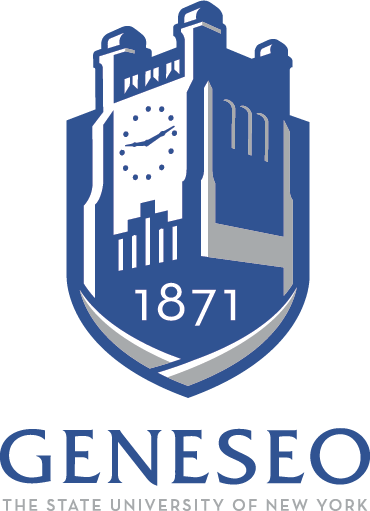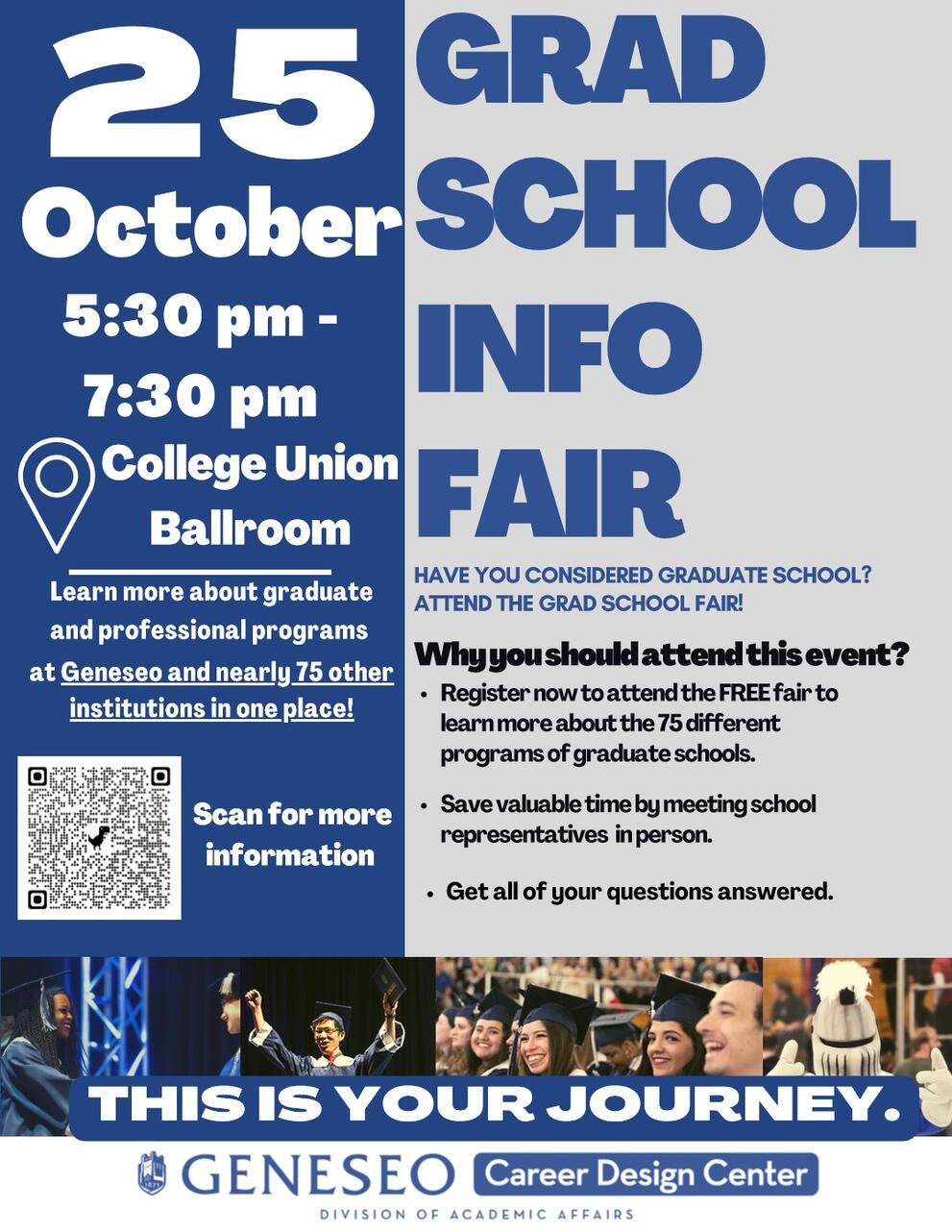Graduate School Fair
Graduate School Fairs present excellent opportunities to explore and learn about graduate schools and receive advice from recruiting professionals.
2023 Graduate School Fair
October 25, 2023
5:30 - 7:30 p.m.
Keep scrolling down for a full list of universities, what to expect, and tips on how to prepare!
Your Hosts

SUNY Geneseo was established by New York State Legislature in 1867, and opened its doors in 1871 as the Geneseo Normal and Training School.Today, SUNY Geneseo is a premier public liberal arts college. Nationally recognized for excellence and value in the liberal arts, Geneseo is known for its exceptional faculty, welcoming atmosphere, and its fiercely loyal alumni.
Located in Houghton (Allegany County) New York, this private, Christian, liberal arts university began in 1883 as a seminary (high school) under the Wesleyan Methodist Connection. Today, Houghton University is a nationally-ranked Christian university of the liberal arts and sciences located in the scenic Genesee River Valley of western New York State.
TOP 5 REASONS TO ATTEND THE GRADUATE SCHOOL FAIR
-
Research programs that are offered by a variety of institutions
-
Compare different schools' objectives, philosophies, and curriculum
-
Discover what preparation you may need before you apply
-
Evaluate whether to begin graduate school right after completing your undergraduate degree or to wait 1 to 5 years
-
Acquire information to help you make decisions about when and where you may apply for
Be Prepared
Your time at a graduate school fair can be successful if you are professional, confident, optimistic, and persistent.
- Questions to Ask
-
- Ask about details of any specific programs that interest you.
- What is the acceptance rate for the program that interests me?
- How many years to complete the program?
- Do you know the graduation rate for this program?
- Where do your graduates from this program find jobs?
- What kinds of financial aid do you offer? Can I get enough of it (through assistantships, work, straight aid) to pay for the whole program?
- What is the application deadline date?
- Must I first take the GREs, (or other national exams) for entrance into the program?
- What is the average entrance exam score and GPA of students who are accepted?
- What are the admission requirements (GPA, undergraduate coursework, entrance exams, experience, interview)?
- Is a thesis, dissertation, or comprehensive examination(s) required for completion of the degree?
- What percent of your graduates are employed in their field?
- When is the application deadline?
- Is there an early admission deadline?
- What is the application process/timeline (application materials, interview)?
- Are students admitted in both the fall and spring semesters?
- How important is it for applicants to have extracurricular activities, volunteer and/or work experience?
- Are there any recommended courses in addition to the stated prerequisites?
- How much does the program cost (tuition, student fees, housing)?
- Is it possible to work full-time and complete the degree as a part-time student?
- Will I complete an internship as part of the program?
- How much choice will I have about where I do my internship?
- How many faculty members are there? What are their areas of research?
- What do you think is unique about your program?
- Will I be able to take electives to pursue other areas of interest?
- What is the projected size of the entering cohort?
- Do you reserve spots for in-state residents?
- A Few Helpful Tips:
-
- Introduce yourself. Telling the recruiters your name is of the utmost importance for your introduction. Enthusiasm and sincerity can endear you to recruiters.
- Manage your time. Be certain that you are devoting enough time to meeting with your target schools so that you effectively market yourself.
- Ask productive, relevant and individualized questions. Be considerate of the recruiter’s energy and time, but be curious to demonstrate that you have researched the school and that you are concerned with your future.
- Obtain the recruiter’s information. Make certain that you know the recruiter’s name, obtain a business card, literature, and know the next step of communication. Remember to thank the recruiter by name for taking the time to speak with you.
- Explore the types of graduate degree programs you would like to pursue and what makes one program better than another. Example: verify licensure requirements, accreditations, field experience hours suggested, etc.
- Research the programs of participating schools and rank each according to your preference.
- Prepare questions to ask the representatives about their programs.
- Research the programs of participating schools and rank each according to your preference.
- Prepare answers for questions you might be asked. Example: your plans after graduation, when you plan to attend graduate school, why you want a graduate degree.
- Look professional. Make a good first impression. Plan to wear casual business attire. You want to project a mature and serious appearance.
- Create, review, and have your resume or portfolio, etc. ready to upload to a representative. You never know when or which representative will be interested in reviewing your materials.
